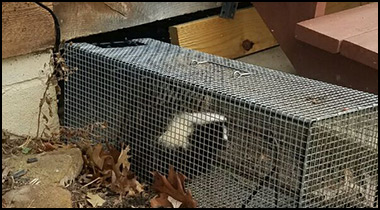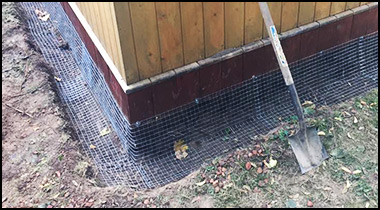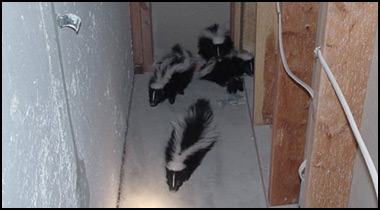Fort Worth Skunk Removal Resources
Skunk Rehabber - 911 Wildlife: (817) 737-0911
Free Tarrant County Animal Services: (817) 451-3436
Humane Wildlife Trappers of Fort Worth: 817-945-3371
If you need skunk control in Fort Worth, you have a few options. First, you can attempt to solve the skunk problem yourself by reading our do-it-yourself guide. If you need outside help, you can also call Tarrant County Animal Services to see if they have any free resources or help for you - however, they primarily deal with dog and cat concerns. You can also call a local Fort Worth wildlife rehabber, as they are typically a great resource for advice that is in the best welfare of the animal. If as a last resort you must hire a professional company, we recommend Humane Wildlife Trappers of Fort Worth at 817-945-3371. To learn more about them or check their skunk removal prices, visit fortworthpestanimal.com.

Fort Worth Skunk Trapping and Removal

Preventative Repairs & Exclusion

Fort Worth Skunk Removal From Structures
In many cases, preventative measures can solve your Fort Worth skunk problem - keep garbage secured, pet food indoors, and most of all when it comes to skunks, secure the perimeter of your shed, porch, deck, or house with a barrier - lattice or steel mesh is good, and it keeps Texas skunks from going under the structure. If trapping and removal of the skunk is the only option you have, please do so with the help of a local agency or professional company who knows how to do it humanely and legally. Browse the resources of this site for more educational information.
Frequently Asked Questions:
Prevention: How to Keep Skunks Away
What to do with a skunk after I catch it?
Is it legal for me to trap a skunk?
How to remove skunk odor
Is a skunk active during the daytime rabid?
What does skunk feces look like?
Fort Worth Skunk Control Information: Why do skunks dig holes?
Skunks have more obnoxious traits than their ability to spray odiferous spew from their anal glands. But their noxious odor is not the only way to identify a skunk. They can be highly destructive with their digging habits. Identifying skunk Tracks is another way to know a skunk is the animal causing damage on your property. The hind and forefeet of skunks both have five distinct toes. The Claw marks are normally visible, but the heels of their forefeet will be obscured. The hind feet will leave tracks that are approximately 2 1/2 inches long from toe to heel.
Skunks will dig holes for a number of reasons. First and foremost, they dig to find food. They search out grubs, bugs, larvae, roots and mice or voles when they find them. They also dig to burrow out a den for nesting and raising their young. The will also dig to get past an obstacle like a fence or wall. As we mentioned before, these opportunistic eaters enjoy a wide range of foods that includes small rodents, small amphibians, eggs, fish, and even garbage, but the really love grubs, worms and burrowing insects. They will also burrow under fences to raid the henhouse of its tasty eggs as well.
Skunks have long sharp front claws that they use to dig cone shaped holes. When skunks move in to areas populated by humans, they have be known to burrow under structures such as like sheds, porches, decks, and even concrete slabs. Skunks can cause extreme structural damage over time when they dig under structures. They can also cause extensive damage to lawns, gardens, farms, athletic fields and golf courses when they dig for insect, roots and grubs in the soil.
In the late summer and early fall, if you find a smallish hole ( about the size of a skunks nose) with dirt in a loose ring around it, it is probably a skunk in search of grubs, larvae, ants, and worms for dinner. These cone-shaped holes can be 1 to 3 inches in diameter, and of varying depths. If you run across these on your Property, you may have a skunk problem and should consider contacting a professional animal control specialist
Remember, for free services you can try (817) 737-0911 or (817) 451-3436, but if you need to pay for professional help, check the prices at the fortworthpestanimal.com website. Or follow our do-it-yourself guide!

